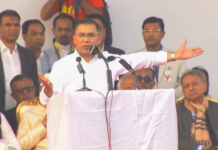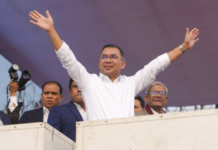New Delhi— Prime Minister Narendra Modi on Saturday congratulated Sushila Karki on taking office as Nepal’s interim Prime Minister, reaffirming India’s commitment to the Himalayan nation’s peace, progress, and prosperity.
Karki, 73, was sworn in late Friday evening, making history as Nepal’s first-ever woman Prime Minister. She also previously served as the country’s first woman Chief Justice.
In a post on X, Prime Minister Modi said: “I extend my best wishes to Right Hon. Mrs. Sushila Karki on assuming office as the Prime Minister of the Interim Government of Nepal. India remains firmly committed to the peace, progress and prosperity of the people of Nepal.”
India Welcomes Political Transition
Earlier in the day, the Ministry of External Affairs (MEA) issued a statement welcoming the formation of the interim government under Karki’s leadership.
“We welcome the formation of a new Interim Government in Nepal, led by Right Honourable Mrs. Sushila Karki. We are hopeful that this would help in fostering peace and stability,” the MEA said.
“As a close neighbour, a fellow democracy and a long-term development partner, India will continue to work closely with Nepal for the well-being and prosperity of our two peoples and countries,” it added.
Political Crisis and Constitutional Questions
Karki’s appointment follows the collapse of the K.P. Sharma Oli-led government earlier this week, amid intense Gen-Z-led protests across the country demanding political reform and democratic accountability.
President Ram Chandra Poudel administered the oath of office after holding day-long consultations with protest leaders, constitutional experts, and military officials.
Karki’s nomination emerged from a wave of public activism, with Gen-Z protestors backing her over other proposed non-political candidates. However, her appointment has also raised constitutional concerns.
Under Article 76 of Nepal’s Constitution, only a member of the House of Representatives can be appointed as Prime Minister. Karki, not being an elected member of Parliament, does not meet this requirement. Furthermore, Article 132(2) bars former Supreme Court judges from holding government office, unless otherwise specified by the Constitution.
Despite these restrictions, Karki has assumed office under the “doctrine of necessity”, a move seen by many as a pragmatic step to stabilize the country amid a political vacuum. (Source: IANS)














